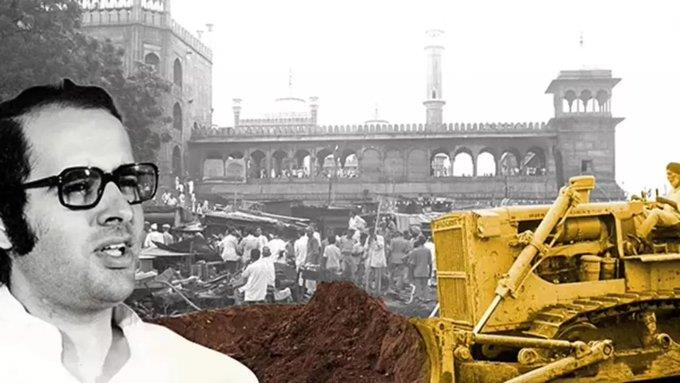Flattened homes, forced sterilisation: Delhi's Turkman Gate residents recall horrors of Emergency

Jun 23, 2025
NEW DELHI: In Delhi's Turkman Gate, the past still walks the narrow alleys. Fifty years after Emergency, the memories live on of their homes being razed, their families scattered overnight, and forced sterilisation drives carried out in the name of progress.
For many families in Old Delhi, the Emergency declared by then Prime Minister Indira Gandhi on June 25, 1975 was not an abstract political moment but a violent rupture in everyday life. It was about fear, chaos and the heartbreak of losing everything, coming wrapped in an official order.
Mehru Nisha, now 74, still shudders remembering the day the demolition squad came.
"They did not give us any warning," she said, adding that her husband tried to stop them but he was shot in the leg. "He collapsed right in front of our house as they brought it down," Nisha recalled.
Even though her husband was injured she and her children were taken to Nand Nagri.
"I had no idea how he was doing, he stayed in a mosque near Turkman Gate for 15 months, as he could not walk and had nowhere else to go. I sold my jewellery just to feed my children," Nisha said.
Nand Nagri, in those days, was little more than open land.
"There was no water, no toilets, no homes. Just jungle, we women stayed together. Even if we had to use the toilet, we went in groups. That's how unsafe it was," she added.
Her husband, Abdul Hamid, now in his 80s, remembers how the protest to save their homes turned into bloodshed.
"We were trying to save our homes and then the police opened fire. I was hit in the leg, locals took me to a nearby hospital. By the time I got back, my family had vanished," he said.
Hamid recalled staying in the mosque for the next 15 months as it became his only shelter.
The tragedy of Turkman Gate did not end with demolitions. The neighbourhood was also swept into the sterilisation drive, a campaign led by Sanjay Gandhi under the guise of population control, according to locals.
Razia Begum, now 75, said she was just 15 then and was a part of the Youth Congress.
"When Sanjay Gandhi visited Jama Masjid, I guided him around. He looked at the crowds and said the area was too densely populated and that sterilisation camps were needed," she said.
Soon, makeshift camps popped up near Dujana House. Razia, not even fully aware of what sterilisation meant, began going door to door to convince people.
"We were told to talk about small families. That people should only have two or three children, or they would struggle to survive," she recalled.
"But people did not want to listen. They insulted men and asked me to leave," she said.
Begum said that in return for undergoing sterilisation, people were given cans of ghee, radios, and Rs 250. But things took a sharp turn when bulldozers knocked on Razia's doorstep.
"When the bulldozers came to Turkman Gate, I joined the protests. I stood with other women from my neighbourhood. I was also injured," she said.
Shahid Gangoi was just a first-year college student when he heard the news that would change his life.
"We were in class when the principal called us. He told us our houses were being demolished. I rushed back, but our home was already gone. My father had been arrested while offering Namaz," he recalled.
The streets of Turkman Gate were filled with broken glass and tear gas.
"Our eyes were burning, we were picked up by police trucks and dumped in Nand Nagri. That place had nothing back then no roads, no water, no shelter," Gangoi said.
The Emergency declared, citing internal and external threats to national security, lasted for 21 months. During the time civil liberties were suspended, the press was censored and mass arrests along with forced sterilisations took place under government orders.
The Emergency officially ended in 1977 after Indira Gandhi called for a general election and released several imprisoned political leaders. The Janata Party, a coalition of opposition groups led by Morarji Desai, won the election with Desai becoming the first non-Congress Prime Minister of India.
Now, half a century later, the Emergency is still a living memory of bullets and bulldozers. The anger may have faded, but the pain has not.